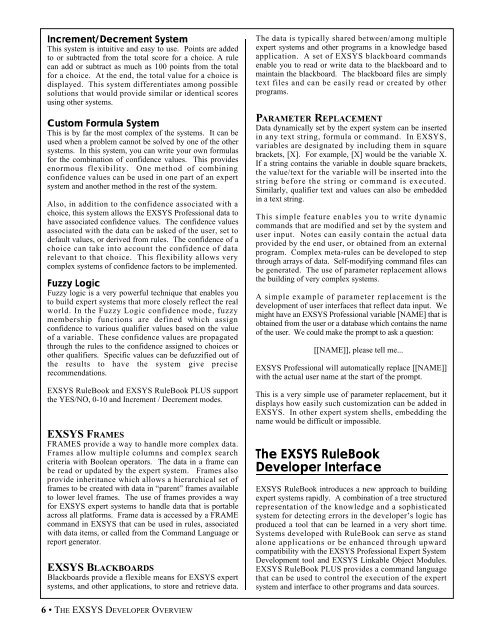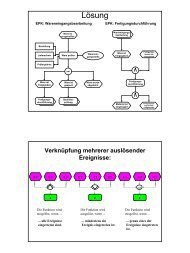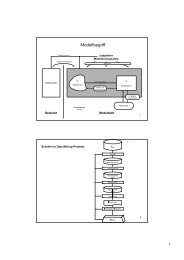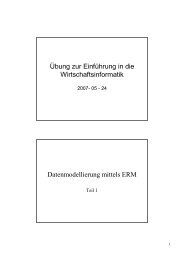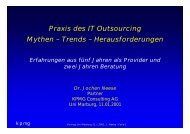EXSYS Professional Developer Interface
EXSYS Professional Developer Interface
EXSYS Professional Developer Interface
Create successful ePaper yourself
Turn your PDF publications into a flip-book with our unique Google optimized e-Paper software.
Increment/Decrement System<br />
This system is intuitive and easy to use. Points are added<br />
to or subtracted from the total score for a choice. A rule<br />
can add or subtract as much as 100 points from the total<br />
for a choice. At the end, the total value for a choice is<br />
displayed. This system differentiates among possible<br />
solutions that would provide similar or identical scores<br />
using other systems.<br />
Custom Formula System<br />
This is by far the most complex of the systems. It can be<br />
used when a problem cannot be solved by one of the other<br />
systems. In this system, you can write your own formulas<br />
for the combination of confidence values. This provides<br />
enormous flexibility. One method of combining<br />
confidence values can be used in one part of an expert<br />
system and another method in the rest of the system.<br />
Also, in addition to the confidence associated with a<br />
choice, this system allows the <strong>EXSYS</strong> <strong>Professional</strong> data to<br />
have associated confidence values. The confidence values<br />
associated with the data can be asked of the user, set to<br />
default values, or derived from rules. The confidence of a<br />
choice can take into account the confidence of data<br />
relevant to that choice. This flexibility allows very<br />
complex systems of confidence factors to be implemented.<br />
Fuzzy Logic<br />
Fuzzy logic is a very powerful technique that enables you<br />
to build expert systems that more closely reflect the real<br />
world. In the Fuzzy Logic confidence mode, fuzzy<br />
membership functions are defined which assign<br />
confidence to various qualifier values based on the value<br />
of a variable. These confidence values are propagated<br />
through the rules to the confidence assigned to choices or<br />
other qualifiers. Specific values can be defuzzified out of<br />
the results to have the system give precise<br />
recommendations.<br />
<strong>EXSYS</strong> RuleBook and <strong>EXSYS</strong> RuleBook PLUS support<br />
the YES/NO, 0-10 and Increment / Decrement modes.<br />
<strong>EXSYS</strong> FRAMES<br />
FRAMES provide a way to handle more complex data.<br />
Frames allow multiple columns and complex search<br />
criteria with Boolean operators. The data in a frame can<br />
be read or updated by the expert system. Frames also<br />
provide inheritance which allows a hierarchical set of<br />
frames to be created with data in “parent” frames available<br />
to lower level frames. The use of frames provides a way<br />
for <strong>EXSYS</strong> expert systems to handle data that is portable<br />
across all platforms. Frame data is accessed by a FRAME<br />
command in <strong>EXSYS</strong> that can be used in rules, associated<br />
with data items, or called from the Command Language or<br />
report generator.<br />
<strong>EXSYS</strong> BLACKBOARDS<br />
Blackboards provide a flexible means for <strong>EXSYS</strong> expert<br />
systems, and other applications, to store and retrieve data.<br />
6 • THE <strong>EXSYS</strong> DEVELOPER OVERVIEW<br />
The data is typically shared between/among multiple<br />
expert systems and other programs in a knowledge based<br />
application. A set of <strong>EXSYS</strong> blackboard commands<br />
enable you to read or write data to the blackboard and to<br />
maintain the blackboard. The blackboard files are simply<br />
text files and can be easily read or created by other<br />
programs.<br />
PARAMETER REPLACEMENT<br />
Data dynamically set by the expert system can be inserted<br />
in any text string, formula or command. In <strong>EXSYS</strong>,<br />
variables are designated by including them in square<br />
brackets, [X]. For example, [X] would be the variable X.<br />
If a string contains the variable in double square brackets,<br />
the value/text for the variable will be inserted into the<br />
string before the string or command is executed.<br />
Similarly, qualifier text and values can also be embedded<br />
in a text string.<br />
This simple feature enables you to write dynamic<br />
commands that are modified and set by the system and<br />
user input. Notes can easily contain the actual data<br />
provided by the end user, or obtained from an external<br />
program. Complex meta-rules can be developed to step<br />
through arrays of data. Self-modifying command files can<br />
be generated. The use of parameter replacement allows<br />
the building of very complex systems.<br />
A simple example of parameter replacement is the<br />
development of user interfaces that reflect data input. We<br />
might have an <strong>EXSYS</strong> <strong>Professional</strong> variable [NAME] that is<br />
obtained from the user or a database which contains the name<br />
of the user. We could make the prompt to ask a question:<br />
[[NAME]], please tell me...<br />
<strong>EXSYS</strong> <strong>Professional</strong> will automatically replace [[NAME]]<br />
with the actual user name at the start of the prompt.<br />
This is a very simple use of parameter replacement, but it<br />
displays how easily such customization can be added in<br />
<strong>EXSYS</strong>. In other expert system shells, embedding the<br />
name would be difficult or impossible.<br />
The <strong>EXSYS</strong> RuleBook<br />
<strong>Developer</strong> <strong>Interface</strong><br />
<strong>EXSYS</strong> RuleBook introduces a new approach to building<br />
expert systems rapidly. A combination of a tree structured<br />
representation of the knowledge and a sophisticated<br />
system for detecting errors in the developer’s logic has<br />
produced a tool that can be learned in a very short time.<br />
Systems developed with RuleBook can serve as stand<br />
alone applications or be enhanced through upward<br />
compatibility with the <strong>EXSYS</strong> <strong>Professional</strong> Expert System<br />
Development tool and <strong>EXSYS</strong> Linkable Object Modules.<br />
<strong>EXSYS</strong> RuleBook PLUS provides a command language<br />
that can be used to control the execution of the expert<br />
system and interface to other programs and data sources.


